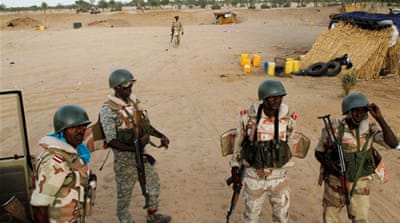Nigeria News
Is A Nigerian Nelson Mandela A Possibility?
By Ayo Olukotun Nelson
Mandela’s prolonged stay in hospital for lung-related complications elicited in his country folks and much of mankind, unprecedented outpouring of good wishes, pro-Mandela demonstrations and prayer vigils for his quick recovery.
United States’ President, Barack Obama who let it be known that Mandela is one of his role models, made it a major part of his recent visit to South Africa to spend time with the iconic leader’s family and to express solidarity. Leaders, civil society actors, students and workers across the globe have identified with the ailing, 94 years old former president widely regarded as a transformational leader who permanently altered the course of history.
Against the backdrop of Mandela’s revered stature as a big impact and much loved statesman, the question arises as to whether Nigeria, Africa’s largest black country, can ever have a leader in the mould of Mandela. The question acquires urgency in the light of ongoing jostling for the nation’s presidency two years ahead of the magic date of 2015.
We know for sure that very few leaders in world history so far have attracted the kind of uncommon love and bonding enjoyed by Mandela from his countrymen. Imaginably, reports that so and so Nigerian leader or former leader are hospitalised usually evoke feelings ranging from mild indifference to the dismissive Yoruba expression, “Onpe ko to ku” (what is stopping him from dying?) Sociologists tell us that such scornful utterances, pungent jokes and ridicule are ways in which afflicted societies get back at unpopular leaders. In other words, sooner than later the rascality, double dealing and negligence of leaders have ways of catching up with them at least in the dismissive responses of popular culture.
But let us go back to the question of whether a Nigerian Mandela is on the cards or whether it is no more than an idle fantasy in the current circumstances. In bringing up this poser, this writer is well aware of excuses that have been offered on behalf of a sadly diminished political class such as we have. For example, some have argued that the division of the Nigerian public sphere into ethnic and religious war camps forecloses the possibility of a Nigerian Mandela. You can only have, they argue, an Igbo Mandela, an Ijaw, Nupe or Yoruba Mandela because the reception and perception of leadership are affected by ethnic and religious prejudices.
At first blush, the argument seems persuasive; when you inspect it closely, however, in the light of South Africa’s own fractured, interracial public sphere, it falls apart easily.
Mandela wrote himself into iconic status, not just by the crucifix of 27 years in detention, 18 of which were spent in the lime quarries of the infamous and harshly isolated Robben Island prison, but perhaps more importantly by forging a ‘rainbow nation’ out of the assortment of races that constitute South Africa.
He not only refused to revenge his cruel victimisation under apartheid rule, but managed to persuade neo-apartheid forces under the Afrikaner Volksfront Coalition, led by General Constand Vilijden from precipitating a disastrous civil war in the heady days of 1993. If heroic resistance to white supremacist rule symbolised by dramatic suburban riots and relentless guerrilla tactics of the African National Congress created the opening for ending apartheid, it was Mandela’s statesmanship that enlarged that opening into a doorway that permitted the birth of the South African nation.
To get back to the point: Ethnicity and religious divisions even when intemperate cannot be the excuse for not having a Nigerian Mandela. Indeed, it may well be the turf as we saw in South Africa and in Abraham Lincoln’s United States for great statesmen to arise, provided they are willing to place the larger interests of the nation above their personal conveniences.
There is the point, too, that by the time Mandela stepped down as president he could easily have converted his larger than life stature into extended, if not permanent rule. Conscious of legacy, and the need to engineer decent political values, he allowed a succession to Thabo Mbeki, a worthy leader in his own right who earned himself a good place in contemporary South African history.
In contrast, we do not see Nigerian leaders who are willing to forfeit the privileges of office in order to promote enduring values or even the survival in the short-term of a nation torn apart by the desperate hustle of its political class for office at any cost. Under the military, the norm was to proclaim what Larry Diamond famously called ‘transitions without end’ in which programmes of so-called democratisation were used as pretexts for elongated personal rule. In the civilian dispensation which began in 1999, the recurrent refrain had been: No vacancy in Aso Rock. Ample sanctions of course await those foolhardy enough to contest the truth of that battle cry. You can check this out by recalling the travails of former vice president, Abubakar Atiku and those of Rivers state governor, Rotimi Amaechi.
Let me digress to posit that apartheid for all its abhorrent discrimination, left in South Africa an infrastructure, even if unevenly of political values into which its emergent black leaders were socialised, apart from substantial infrastructural development in the major cities which make the country look like many parts of the first world. Mandela was in a sense produced by that culture even as he opposed its extremities, drawing on, both in protest and in conciliation, essential elements of his African roots to produce a unique blend.
Back to Nigeria; our leadership deficit is matched only by the regression of values and of decency in political and social life. When was the last time any political office holder resigned their appointment on grounds of public opprobrium? Even when they face a storm, they inform us about which political enemies are behind it, rather than bow out honourably in order not to pre-empt public inquiry. Mandela gave himself up, poured his entire life into the struggle to first liberate his people and then to elevate their status and dignity. He cared less if he died or had to quit office in this all consuming enterprise.
For as long as Nigerian politicians and their praise singers do not see beyond their noses and personal comforts; for as long as office seeking for short-term benefits is their preoccupation, such as it is today, so long will the prospect of a Nigerian Mandela appear like a sour jest. Worse still, a reprobate political class might bring the national roof crashing down on everybody.
We cannot foreclose however the possibility even if currently dim of a Mandela arising from the fringes and the shadows of the current Nigerian impasse. After all, we must keep hope alive in order to surmount or tide over depressing times.
•Prof Olukotun is Dean of the Faculty of Social Sciences and Entrepreneurial Studies at Lead City University, Ibadan.
•E-mail: [email protected], Mobile:07055841236
——————————————————————————————————————————————-
Posted in Nigeria News. A DisNaija.Com network.
Source: PM News
DisNaija.Com publishes regular posts on Nigeria News, Nigerian Newspapers, Online Nigeria Gist.
Follow us on Twitter and Facebook.
Nigeria News
Follow @Dis_Naija
Your Opinion Counts. Be sure To Leave A Comment, If You Have Any.
Please Like, Share or Tweet. Your Support Is Appreciated.

Nigeria News
Kano Transfers Over 1,000 Almajiris To Different States Amidst COVID-19 Pandemic

The Kano State Government on Saturday said it has transferred 1,098 ‘almajiris’ to different states of the country.
The commissioner for local government, Murtala Garo, disclosed this while presenting a report before the state’s task force on COVID-19 at the government house, Kano.
Almajiris are children who are supposed to be learning Islamic studies while living with their Islamic teachers. Majority of them, however, end up begging on the streets of Northern Nigeria. They constitute a large number of Nigeria’s over 10 million out-of-school children.
Mr Garo said the Kano government transported 419 almajiris to Katsina, 524 to Jigawa and 155 to Kaduna. He said all of them tested negative for coronavirus before leaving the Kano State.
Despite the coronavirus test done in Kano for the almajiris, the Jigawa government earlier said it would quarantine for two weeks all the almajiris that recently arrived from Kano.
Mr Garo said another 100 almajiris scheduled to be taken to Bauchi State also tested negative to COVID-19.
In a remark, Governor Abdullahi Ganduje said the COVID-19 situation in Kano was getting worse. He appealed for a collaborative effort to curtail the spread of the virus in the state.
Mr Ganduje, who commended residents for complying with the lockdown imposed in the state, said the decision was taken to halt the spread of the virus.
Kano State, as of Saturday night, has 77 coronavirus cases, according to the Nigeria Centre for Disease Control.
The decision to transfer the Kano almajiris is part of the agreement reached between Northern governors that almajiris in each state be transferred to their states of origin.
However, even before the latest agreement by the governors, the Kano government had been transferring almajiris to other states and neighbouring countries after it banned street begging in the state, most populous in Northern Nigeria.
Despite the transfers, however, no concrete step has been taken to ensure such children do not return to Kano streets as there is freedom of movement across Nigeria although interstate travel was recently banned to check the spread of the coronavirus.
Sourced From: Premium Times Nigeria
Nigeria News
COVID-19: ‘Bakassi Boys’ Foil Attempt To Smuggle 24 Women Into Abia In Container

By Ugochukwu Alaribe
Operatives of the Abia State Vigilante Service, AVS, popularly known as ‘Bakassi Boys’ have arrested 24 market women hidden in a container truck, at Ekwereazu Ngwa, the boundary community between Abia and Akwa Ibom states.
The market women, said to be from Akwa Ibom State, were on their way to Aba, when they were arrested with the truck driver and two of his conductors for violating the lockdown order by the state government.
Driver of the truck, Moses Asuquo, claimed he was going to Aba to purchase stock fish, but decided to assist the market women, because they were stranded.
A vigilante source told Sunday Vanguard that the vehicle was impounded while the market women were sent back to Akwa Ibom State.
Commissioner for Home Land Security, Prince Dan Okoli, who confirmed the incident, said that smuggling of people into the state poses great threat to the state government’s efforts to contain the spread of COVID- 19.
Sourced From: Vanguard News
Nigeria News
Woman Kills Her Maid Over Salary Request

Operatives of the State Criminal Investigation and Intelligence Department (SCIID), Yaba of the Lagos State police command have arrested one Mrs Nene Steve for allegedly killing her maid, Joy Adole
The maid was allegedly beaten to death by Nene for requesting for her salary at their residence located at 18, Ogundola Street, Bariga area in Lagos.
Narrating the incident, Philips Ejeh, an elder brother to the deceased said that he was sad when they informed him that his sister was beaten to death.
He explained that the deceased was an indigene of Benue State brought to Lagos through an agent and started working with her as a maid in January 2020.
‘’She reported that her boss refused to pay her and anytime she asked for her salary she will start beating her.
She was making an attempt to leave the place but due to the total lockdown she remained there until Sunday when her boss said she caught her stealing noodles and this led to her serious beating and death,’’ Ejeh said.
He called on Lagos State Government and well- meaning people in the country to help them in getting justice for the victim.
The police spokesman, Bala Elkana, stated that the woman and her husband came to Bariga Police Station to a report that their house girl had committed suicide.
Detectives were said to have visited the house and suspected foul play with the position of the rope and bruises all over the body which confirmed that the girl had been tortured to death and the boss decided to hang up the girl to make it look like suicide.
He said: “The police moved on with their investigation and found a lot of sign of violence on her body that she has been tortured before a rope was put on her neck.’’
He added that the police removed the corpse and deposited it in the mortuary for autopsy to further ascertain the cause of the death.
Elkana said the matter has been transferred from Bariga police station to Panti for further investigation while the couple have been arrested and will be charged to court.
Tribune
Boko Haram Attacks: Buhari Summons Urgent Meeting Of Service Chiefs

Ostensibly alarmed by the latest killings of dozens of soldiers by Boko Haram insurgents, President Muhammadu Buhari has summoned an urgent meeting of Service Chiefs to find ways to stop the trend.
He has also dispatched the Minister of Defence, Mansur Dan Ali, to the neighbouring Republic of Chad for an urgent meeting with President Idris Deby and his defence counterpart.
Knowledgeable sources said in Abuja on Friday that the president is worried by on the deterioration of security situation on the Nigeria – Chad Border that has led to the recently increased Boko Haram terrorism in the area.
The sources which did not want to be named in Abuja said: “Nigeria has a Chad problem in the Multi-National Joint Task Force (MNJTF) put together to secure the Lake Chad basin areas and repeal the Boko Haram terrorist attacks against all the countries neighbouring the Lake.”
The sources noted that Chad is believed to be having their own internal security challenges and this has reportedly led to their pulling away their own troops manning their own border around Lake Chad, saying: “That lacuna is being exploited by the Boko Haram terrorists, who go in and out of Nigeria, Niger and Cameroon to launch terrorist acts. This is a clear illustration of the fact that terrorism is beyond national borders.”
When contacted, the Senior Special Assistant to the President on Media and Publicity, Garba Shehu, confirmed that the Defence Minister is going to Chad but said he is unaware of the purpose.
Meanwhile, the military authorities are said to be in the process of identifying the families of the latest victims with a view to making contact with them.
Credible sources revealed that it is the reason the president is yet to make any pronouncement on the matter.
“The President has called an urgent meeting with the Service Chiefs, as well as the fact that families of the latest victims of the Boko Haram are being identified and contacts made before a government pronouncement on the tragic attacks. This, it is understood, is the reason for the silence of the government over the incident,” the source said.
Sourced From: Tribune




















